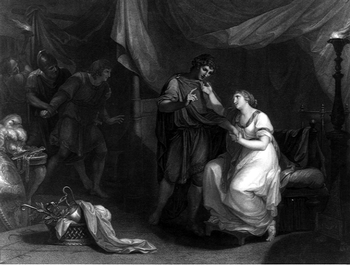Dr. Michael Delahoyde
Washington State University
TROILUS AND CRESSIDA
ACT V
"The fifth act falls apart" (Asimov 124).
"In the history of literature, Troilus and Cressida, with its
confused and confusing last Act, must therefore be one of the best
examples of metaphoric structure. The moral disorder within the fictional
world is reflected by the structural disorder in the textual depiction of
the fictional events" (Sutherland & Watts 167). But Chaucer did this in
Book Five of Troilus and Criseyde. As in Chaucer's poem, the final
fifth portion of the work seems to disintegrate. Here, we find the
unusual breakdown into ten scenes, and key plot questions, much less more
sophisticated enigmas, remaining cloudy or unanswered.
SCENE i
Achilles is getting sly like Ulysses and mentions his intention to ply
Hector with wine on the eve of his attack on him. Thersites insults him
and Patroclus -- Achilles' "masculine whore" (V.i.17) -- at length.
Warriors retire for the night.
SCENE ii

|
Troilus and Ulysses eavesdrop on Cressida and Diomed, and Thersites spies
on the spies. It's gruesome, and may reflect Oxford's take on Elizabeth
taking up with Raleigh (Ogburn and Ogburn 613). Cressida has promised
something unspecified, entertains his advances, and even offers him
Troilus' sleeve. She seems to agonize about it all, but we're less
convinced this time with this behavior. "Ah, poor sex! this fault
in us I find, / The error of our eye directs our mind" (V.ii.109-110)
-- too easy a pronouncement. And Ulysses functions as an Iago from
Othello.
"The outcome in Troilus is an anguished philosophical examination of the
instability of the human personality" (Wells 220). His "Was Cressid
here?" rant is "denial carried to its metaphysical limits" (Bloom 337).
And the disgusting food imagery returns: "The fractions of her faith,
orts of her love, / The fragments, scraps, the bits and greasy relics /
Of her o'er-eaten faith, are given to Diomed" (V.ii.158-160).
|
Thersites has the final comment. He's disgusted too and declares,
"Lechery, lechery, still wars and lechery, nothing else holds fashion"
(194-195).
SCENE iii
Hector insists on entering battle despite Andromache's prophetic dream
(cp. Julius Caesar), Cassandra's warnings, his mother's ominous
visions, and Priam's appeals. Somewhat convincingly, which is a horrible
admission and testament to the validity of the outlook of this play,
Hector enthusiastically insists that honor is at stake.
Pandarus, plagued by a cough suggesting ill health, delivers to Troilus a
letter from Cressida, but a quick glance and Troilus declares it (echoing
Hamlet), "Words, words, mere words, no matter from the heart"
(V.iii.108). He tears it up. "Shakespeare provides for the audience a
scenario at once moving and tragic: the spectacle of two characters
struggling blindly against their own mythic identities" (Garber 558-559).
"For Cressida herself, struggling not only against the political will of
the Greeks and Trojans but also against her character's notorious
literary history, there is, alas, no reservoir of personal agency,
however much she tries to summon it" (Garber 562). Pardarus' "aching
bones" may allude to Burghley's gout (Ogburn and Ogburn 628-629).
SCENE iv
Thersites serves as commentator on the battle. It's pretty funny:
relentless cheekiness.
SCENE v
Diomed has robbed Troilus of his horse (and remember horse symbolism) and
commands his servant to present it to Cressida. Agamemnon recites names
of the wounded and dead; he doesn't know the status of Patroclus. A
moment later, Nestor reports the death of Patroclus, and Ulysses reports
that Achilles is arming himself as a result. Ajax seeks Troilus, Achilles
Hector.
SCENE vi
Diomed and Ajax vie for the right to battle Troilus. We won't know what's
become of Troilus for quite a while. Achilles and Hector begin to fight,
but Hector begs a temporary reprieve so that it's a fairer fight at this
point. How chivalric, you moron. Hector then sees an unidentified knight
in glorious armor and attacks him for the armor -- the glitzy surface.
There he goes again -- being noble and then inconsistently sinking to
baser lusts.
SCENE vii
Achilles rounds up his thugs, the Myrmidons. Margarelon, "bastard son of
Priam's" (V.vii.15), challenges Thersites, but the latter announces that
he is a bastard, and there should be no fighting among bastards.
SCENE viii
"Most putrefied core, so fair without,
Thy goodly armor thus hath cost thy life." (V.viii.1-2)
The same will be true shortly of Hector himself, killed by Achilles'
thugs. But we've been removed, estranged from Hector, so we don't quite
get the full tragic effect. "Shakespeare seems to invented the matter of
the apparently instantaneous decomposition of the richly armoured man"
(Sutherland & Watts 170). A body can't decay so fast as indicated here,
but symbolically, this episode is necessary.
Hector's "encounter with the 'one in armour,' who never speaks, and who
is the proximate cause of Hector's own death, has always seemed to me
to carry another, more uncanny resonance, as if Hector were coming
face-to-face with Death itself -- and with his own mortality" (Garber
543).
"Hector is a warrior who sees through war. The tragedy lies in his
failure to live up to his vision" (Goddard, II 22). Our first
news of him was crummy. In general he was honorable. But he slipped
up in the end. "Nowhere in Homer, nor anywhere else in this play, does
Hector give anyone reason to think he would ever call a foeman 'beast'
or take the attitude that war is a hunt, with other men playing the role
of animals" (Asimov 129). It all seems so arbitary, yet better than
Achilles having his goons butcher this would-be chivalric knight and
then command that rumor be spread that he, Achilles, won in combat.
"For Achilles to kill Hector in this way is unthinkable in a Homeric
context and must strike any lover of the Iliad as simple
sacrilege. But there it is -- the medieval pro-Trojan, pro-Hector
view" (Asimov 130). "Hector dies, and almost everyone else lives
unhappily ever after. The biggest casualty, however, is the cherished
Homeric ideal of western civilization, which receives the rudest
squashing ever endured at the hands of a poet" (Farina 160).
SCENE ix
News spreads among the Greeks that Hector is slain. Ajax recognizes that
Hector was at least as good a man as Achilles. "And though [Shakespeare]
lets Ulysses slip quietly out of the action of the play, he has made
abundantly clear the guilt that is upon his head for the murder of
Hector" (Goddard, II 35).
SCENE x
News spreads among the Trojans that Hector is slain and being dragged
along, tied to the tail of Achilles' horse. Troilus laments having to
break the news back home. Pandarus shows up and Troilus curses and
strikes him.
"Pandarus is in the process of being turned into the type figure of the
pander" (Wells 224). In a kind of epilogue, he complains that panderers
are underappreciated. "O traders and bawds, how earnestly are you set
a-work, and how ill requited! Why should our endeavor be so lov'd and the
performance so loath'd?" (V.x.37-39). This is a lovely damnation of war,
with all the glorying of heroes and sanctimonious tsk-tsking of the grim
realities.
It sounds as if Pandarus is dying of venereal disease, and he essentially
bequeaths such diseases on us all.
he addresses the audience in an epilogue-like speech which wrenches the
play into the time at which it is being performed. Without this episode
the play may be seen as a tragedy; with it, the ending is less positively
conclusive yet even more bleak and bitter. Pandarus has been one of the
play's main sources of comedy; now, ridden by venereal disease, cursed
by Troilus, he speaks across the centuries, still pathetically adopting
the pose of entertainer, but finally, addressing his "Brethren and sisters
of the hold-door trade", bequeathing them nothing but his diseases.
(Wells 224)
FINAL PERSPECTIVE
It seems too breezy to claim simply that this play is "a fundamental
interrogation of heroic values along with a painfully realistic portrayal
of the growth and breakdown of an intense love-relationship that founders
under the pressures of war" (Wells 215).
"For all its suffering and slaughter, central characters in the play are
too stupid and hypocritical to deserve tragedy. Black comedy,
savage farce, theatre of cruelty; yes, they might deserve something like
that" (Sutherland & Watts 164). They don't have the "inwardnesses" of other
characters from the plays (Bloom 331). "For brainlessness, Agamemnon,
Nestor, and Ajax are all nicely matched, while Cressida is as much the
Trojan strumpet as Helen is the Spartan whore" (Bloom 333). Shakespeare
"estranges" us from even Hector and Troilus (Bloom 329).
We also see "The emergence in the play of mercantile language, language
of buying, selling, trading, and the marketplace, rivaling and replacing
the older language of courtly aristocracy, challenge, and honor" (Garber
537). It is a "new, fallen world (the world of money, mercenaries, and
Myrmidons)" (Garber 538).
Asimov proposes that the Essex business troubled Shakespeare, and thus:
These expeditions were fought for what seemed to Shakespeare, perhaps,
to be a most ungrateful and worthless woman who was oblivious to the
sufferings of her faithful servants and whom he may have envisioned as
amusing herself with Essex's rival, Sir Walter Raleigh, while the faithful
Essex was suffering in the field. Could this be why Shakespeare draws Helen
as so contemptible? ... And Cressida, of course, would then be another
aspect of Elizabeth -- that false woman who had betrayed her lover and
sent him to the gallows. (Asimov 120)
Is Cressida another version of the Dark Lady of the Sonnets and this the
story (like Rosaline in Love's Labour's Lost) (Bloom 328). Indeed,
Cressida seems to fit the three main women in Oxford's life: Elizabeth,
Anne Cecil, Anne Vavasour (Ogburn and Ogburn 611-612). There has been
the suggestion that the Earl of Essex may have been "the model
for the play's outrageous Achilles, or perhaps there are other political
allusions that we no longer apprehend" (Bloom 327). Ben Jonson informs
Ajax, like Malvolio (Bloom 342). Oxford's slimy cousin Henry Howard is
a candidate for Pandarus (Farina 162), though Burghley fits much better.
The elder Ogburns sketch the intentions of Oxford's later revision of the
play, when because of literary wars and insults, the play blasts Ben Jonson
and Geroge Chapman. Ajax becomes a depiction of Jonson, the "uninspired"
and slow worker (Ogburn and Ogburn 1015-1016) known for his "arrogant,
self-righteous" vanity, self-conceit, and sycophancy (Ogburn and Ogburn
1017, 1021). Oxford is still Ulysses (Ogburn and Ogburn 1016), and the
derision of Achilles reflects the fact that most did not know the true
relationship between Oxford and Southampton (Ogburn and Ogburn 1019).
|
Perhaps the play "defeats any wholly coherent interpretation" (Bloom
332), but the play's message can be seen as "a more extreme and ...
cynical version of exactly that psychology of callousness and fury that
we encounter in varying degrees in Richard II, Henry V, and
Hamlet" (Goddard, II 35). This time Shakespeare disallows a safer
reception and interpretation.
And whose bright marketing idea was it to name a car after the
paragon of unreliability: the Toyota Cressida?
|

|
Shakespeare Index

